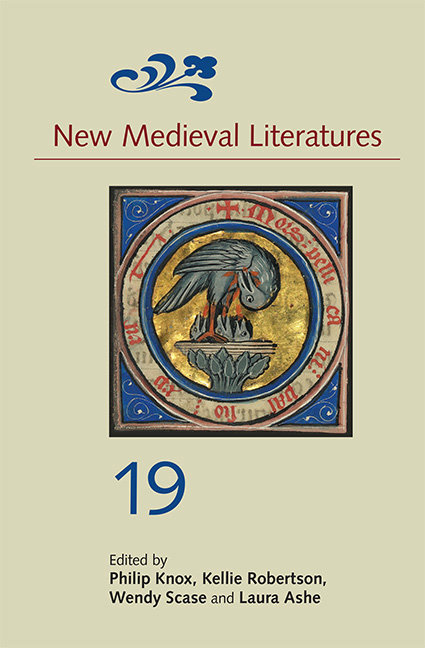Book contents
- Frontmatter
- Contents
- 1 A Scottish or English Saint? The Shifting Sanctity of St Aebbe of Coldingham
- 2 Monastic History-Writing and Memory in Britain and Ireland: A Methodological Reassessment
- 3 Language, Morality, and Wordplay in Thirteenth-Century Anglo-French: The Poetry of Walter de Bibbesworth
- 4 Open Form and Canonic Matter in Trecento Song
- 5 ‘Uninhabited’: Eco-Colonial Anxieties in Late Medieval Icelandic Saga
- 6 ‘Betwen tuo stoles’: The Western Schism and the English Poetry of John Gower (1378–1417)
- 7 Cognition and Conversion in Alain Chartier's Livre de l'Espérance
1 - A Scottish or English Saint? The Shifting Sanctity of St Aebbe of Coldingham
Published online by Cambridge University Press: 31 August 2019
- Frontmatter
- Contents
- 1 A Scottish or English Saint? The Shifting Sanctity of St Aebbe of Coldingham
- 2 Monastic History-Writing and Memory in Britain and Ireland: A Methodological Reassessment
- 3 Language, Morality, and Wordplay in Thirteenth-Century Anglo-French: The Poetry of Walter de Bibbesworth
- 4 Open Form and Canonic Matter in Trecento Song
- 5 ‘Uninhabited’: Eco-Colonial Anxieties in Late Medieval Icelandic Saga
- 6 ‘Betwen tuo stoles’: The Western Schism and the English Poetry of John Gower (1378–1417)
- 7 Cognition and Conversion in Alain Chartier's Livre de l'Espérance
Summary
This essay offers the first large-scale investigation of the cult of St Aebbe of Coldingham, focused upon its textual outputs from the seventh up until the early sixteenth centuries. It presents a nuanced picture of Aebbe's changing representations through these centuries, directed in particular toward her malleable geo-political identities (Northumbrian, Berwickshire, English and Scottish), and the ways in which she alternately upholds and disrupts conventions of saintly gender and sexuality. In addition to staging a close reading of Aebbe's twelfth-century Latin Vita, the essay is the first to pay attention to her presence in a number of fourteenth- and fifteenth-century Latin legendaries of native saints, turning the spotlight upon these unjustly neglected compilations, and demonstrating their value as forms of historical evidence capable of refracting inter-regional rivalries and questions of regional versus national allegiance, and presenting those tensions in a new light.
The fourth book of Bede's Historia ecclesiastica gentis Anglorum, tracing England's Christianization by means of its missionaries and saints, is often known as his book of abbesses. In it, Bede commemorates the lives of the female founders of the some of the earliest English monasteries dating from the second half of the seventh century: St Aethelburga of Barking, St Aethelthryth of Ely, and St Hilda of Whitby. All three are eulogized for their personal virtue and judicious governance, while the monasteries that they preside over are extolled as centres of exemplary piety and learning. However, there is also a tainted institution appended to this utopian monastic landscape, an anti-example as it were, designed to warn readers about the particular dangers and temptations associated with the monastic way of life. Immediately following the life of St Hilda of Whitby, Bede turns his focus to the double monastery of Coldingham, a northern outpost of the seventh-century kingdom of Northumbria, and describes how it is burnt to the ground by divine fire as a consequence of the wickedness of the inhabitants. Earlier in Book Four, Bede has already referred briefly to the foundation of Coldingham by Aebbe (615–83), the daughter of King Aethelfrith of Northumbria, and sister of Kings Oswald and Oswui, who appears to have shared her brothers’ childhood exile in south-west Scotland and is known to have received the veil from Bishop Finan of Lindisfarne after her return.
- Type
- Chapter
- Information
- New Medieval Literatures 19 , pp. 1 - 42Publisher: Boydell & BrewerPrint publication year: 2019



